Share

Invisible Not Broken - Chronic Illness Podcast Network
Gas Lighting: Searching For Chronic Illness Diagnosis in American Healthcare System (Its' funnier than it sounds and just as frustrating)
Did I get lucky! I got to make a new friend. I hope you enjoy listening to Jen. She is an amazing poet and at the end of the interview you can hear two very powerful poems. She is hilarious and strong. She has been dealing with being sick and frail even though she has made massive changes (loosing 100lbs) and has just started in on her 40's. We talk about parenting with a chronic illness, the American healthcare system (buckle up its' about to get political), the importance of art when you can't get out of bed, and how important friendships are especially when you are dealing with chronic invisible illness.
Ms. T's Answers {More Bad Ass Than Mr. T}
Jen Toal
Age 40
Conditions
PTSD, Chronic Pain, Extensive nerve injury nerve injuries in both arms, Not Quite Fibromyalgia (is that a thing?), planters fasciitis, Anxiety/Depression
(...Hang on, maybe Ehlers-Danlos?? Amazing the things you can learn doing podcast interviews...) After watching Jen through the interview I was impressed at all of the crazy shapes she was making while stretching. She also has the swan deformity and so many other symptoms of the disorder I have.
I can remember school officials started stepping in around middle school to try to help Mom and I address my symptoms. They couldn't find much obviously wrong with me, except for some scoliosis. In high school, I was given special locker accommodations each year to try to help reduce the load on my body and as an eighteen-year-old, our family doctor explained to me that I was experiencing the same daily pain as most eighty-year-olds. This was before the injuries of my twenties and thirties.
I didn't get far working with that doc because growing up means losing access to health care in our country.
In my early twenties, I was working in tech support and saving for further college when all the nerves on both my arms were blown out by repetitive stress from typing. I spent the next several years in surgery and disabled. I got LOTS of doctor attention, but only on the subject of my work injuries. They were there to repair me from what they had done, not heal me overall.
The worst part of those years was being unable to draw.
In my thirties I found reasons to stop giving up on my life, most notably my husband, John, and our sweet child. John and I changed so many of our daily habits that together we lost three hundred pounds.
https://www.facebook.com/shapeshifterconfessions/
Losing 45% of my pre pregnancy body weight has done amazing things for my health, but it's not the miracle cure it *looks* like from the outside. For one thing, jumping up out of my sick bed to chase my snuggly little kettle bell around gave me a wicked case of Plantar Fasciitis. It's a remarkably painful addition to my dappling of symptoms but was acceptable collateral damage to me.
1. Who were you before your illness became debilitating?
A child.
2. Is there anything you would do if you were not sick?
There are so many things. I would have so much more of a career. I would travel. I would go out in the evenings and be around people. I would make so much more art.
3. What should other people know about our daily life?
That it's super easy for them to forget, but it's always there, reminding me. That it's exhausting to manage pain.
4. What would make living and moving in the world easier for you?
Single Payer Healthcare and Universal Basic Income.
In my twenties I spent a lot of time with people who liked to play, "What if we won the lottery??" My answers always began with access to doctors and therapists.
5. Life hacks?
Tennis balls are my latest favorite backpack staple. I sit and lean on them for point massage. They are especially magical for car trips, which have always been rugged for me.
My backpack itself is my favorite tool, but like many medications that come with side effects, the magic bag does sometimes get ridiculously heavy.
6. Support from family or friends?
I married really well. My husband is marvelously supportive and encouraging. My mother would help more if she were closer.
Friend community cares from afar, but we are all spread so perilously thin...
I saw this art show with a display that said, "We are living in an era that is testing the limits of everyone's compassion." I worry about all of us. Times are tough, and getting tougher, and I don't feel like my communities have the space to hold me up. Not because they don't care, but because they're fighting so hard to keep themselves going.
7. Do you find that people do not believe you are sick because of your appearance? How has this affected you positive or negative?
Yes. All the time. It's horrible. I spend a bunch of time disappointing the humans around me because I look so healthy, especially after my weight loss, but I am still frustratingly limited.
8. How has this affected your relationships?
It torpedoes them sometimes. On the other hand, it can allow for deep bonding when we understand each other.
9. What are you afraid to tell even the people closest to you?
How bad the pain is. How pervasive it is. How scared I am of the future.
10. Does the fact that your disease is invisible change how healthcare professionals treat you?
Yes. They often disbelieve me. I've been accused of being drug seeking. Which is pretty funny, given how much time John spends trying to convince me to take something.
11. Best coping mechanism?
Diffuse awareness. Forgetting. Drawing.
12. Favorite swear word?
John says if hell counts, it's hell. Lol
I have a hard time picking. Shit, fuuuuuuuuuuuuuck, godsdammit.
13. What are you the most fearful of and what are you the most hopeful for in the future?
I'm terrified that I'll be unable to support my family in the ways they need me. I'm hopeful about the ways I have learned over the years that people make their livings with skills I totally retain access to, even as my spacesuit gets quietly wonkier...
Cardboard Decades
when i say ricky was my best friend, what i mean is
he was my first consensual sexual partner
i turned 5 while mom and i lived in his mother's house
he was 6
i once pulled his little brother, fallen-comrade-style,
across train tracks in the very nick
wouldn't know for decades how scared i should've been
they taught me prank calling and ladybug sailing
how to be kind to the kind doberman
and keep my dolls far away from the angry one
ricky and i were softness and exploration
in an already cruel and confusing world
i remember being 8 or so
sun-drenched in the back of my grandmother's very nice car
i wouldn’t know for decades about love languages
but i knew in california i was given things, but few hugs
and in texas, hugs, but few things
i preferred hugs
but it was well known that "daddy warbucks"
and family had more money than made any sense
and they didn't get as much time to be affectionate
so it made sense
that they'd want me to have touchstones of affection
when i went back to my mother's wars
how could they know?
mom would send them letters,
as she says, "full of things we never did.
places we were never going to be."
it wasn't just that we couldn't get above the poverty line
i wouldn’t know for decades the term “human trafficking”
my poor mother.
i also hadn't learned the different ways a car can sit
that day i was walking home
with ricky
mom pulled over
countenance confusing
told me only i could get in
drove away
before telling me we'd never go back
i would never say goodbye
i wouldn’t know for decades
that the reason no one understands
what i mean when i say
we “moved a lot” when i was a kid
is because i don't understand
what i should be saying
is we were homeless
for more of my childhood
than i had realized.
only way to explain
we have to move whenever someone gets mad
or
my doll protects me from the mean girl
i share a bed with
or
we take my most evil stepdad back
eleven times
he's charming
and when he's around churches don't have to bring us things
or
the motels. national parks. so many places
i stop calling where i sleep anything other than "the house"
know if i learn the path from house to grocery, it’s probably time to go
try out different versions of my name in different schools
sometimes compassion is a shovel to the gut
often my mother wakes up screaming
i’ll never know how many trains she pulled us from the teeth of.
only reluctantly came to see the damage of
rootlessness on a childhood
perpetual motion was our only way of survival.
i ran into ricky a couple years later
awkward amongst other kids
eons away from the life we had shared
i’ve been trying to shift my relationship with cardboard
dismantling all my boxes
learning to build some belief
i might just get to stay
advice i am giving myself
upon meeting new soul mates
stand solidly
if you are able
hold your form fluid
brace for beauty
and the way it always
knocks you over
notice press of globe
up through soles
marvel at the moments experience
and universal
shake hands
trade knees
compare the roads you have run
the trees you jumped out of
the places your jeans have worn through
skip right past groins and sex
this isn't that poem
and connection
can be better
for being less obvious
instead
press your belly buttons together
a meeting of absences
shared space to frame things
frame things
redo this if it
feels more truthful
consider the strengths of your mat
let the space placed around
your best work
have its own things to say
say things
out loud
experience is meant to be shared
and no one needs your
perspective
more than a soul mate
trade scars stories
(tattoos totally count)
tell each other tales of the ways
the world hasn't ended
even if it left a mark
breathe
feel belly press belly
laugh
you've been sucking down discord
all day
like too little sleep
too much wireless
and a fundamental disconnect
from how our species evolved
to thrive
agree to thrive anyway
slice out space for each other
in the places you
forget to feel shame
allow yourself
and each other
forgiveness
for everything you’ve ever believed was wrong with you.
there’s never been anything wrong with you.
except not knowing there was nothing wrong with you.
forgive yourself
for lying to yourself
in order to stay small
it’s okay to not be everything
we are all of us everything together
and we forget we don’t have to
do it alone
give up the notion
you may somehow
be on the same page
you’ve only just collided
from across the cosmos
the particular constellation
of harmonic convergences
your empty spaces
express
as you pass through each other
are not the same
as being the same
we are stronger for our differences
befuddling though they be
decide this is the game
and that you are always winning.
because you are.
Don't Miss A Thing
Sign up with your email address to receive news and updates.
Email Address Sign UpWe respect your privacy.
Thank you!More episodes
View all episodes
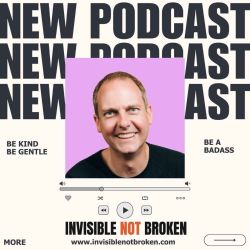
Vulnerability, Resiliency, and Advocacy with Tim Reitsma
47:06Monica Michelle is joined by consultant and podcast host Tim Reitma.Tim lives with Crohn's Disease.In this episode, Monica and Tim discuss: Tim’s resiliency through managing his Crohn’sThe importance of self-advocacy, especially in the workplace Tim’s podcast why he shares stories of those with invisible illness TIMESTAMPS00:47 - Tim's diagnosis 06:31 - How and why Tim applies self advocacy15:41 - Why Tim started his podcast22:42 - Invisible condition etiquette31:00 - What HR can do better for employees with invisible illness39:31 - Tools Tim uses to care for his Crohn’s outside the homeThe full transcript and all links mentioned can be found on the episode page on invisiblenotbroken.com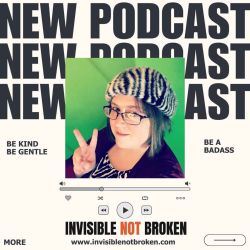
Tech and Disability: What VR Offers the Disabled Community with Sunny Ammerman
01:10:27Monica Michelle is joined by artist and disability advocate Sunny AmmermanSunny lives with Septo-optic dysplasia, panhypopituitarism, Optic Nerve Hypoplasia, and is missing a membrane in the brain called the "septum pellucidum".In this episode, Monica and Sunny discuss: Sunny’s complex disorders and how she copes with themEverything VR provides from accessible gaming, social platforms and the potential for better online education.Various VR/AR games and their gameplay Sunny’s VR support groupTIMESTAMPS00:45 - What VR/AR offers for chronically ill and disabled folks11:57 - Sunny’s conditions and how she copes with them17:55 - Features that make VR games accessible or inaccessible as well as different games and their play experiences37:13 - The social aspects of virtual gaming51:32 - What opportunities VR has for the future1:04:49 - Sunny’s VR support group The full transcript and all links mentioned can be found on the episode page on invisiblenotbroken.com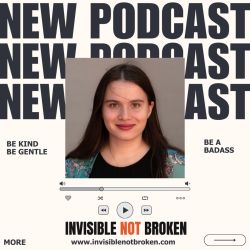
Reporting on Chronic Illness and Disability with Journalist Julia Metraux
39:16Monica Michelle is joined by Journalist Julia Metraux.Julia lives with vasculitis, mild to moderate hearing loss, and has experienced long COVID.In this episode, Monica and Julia discuss: Julia's diagnosis with vasculitis and how it influences her journalistic lensHow community impacts the mental health of those with chronic illnessHow Julia and Monica find positives and negatives in the internet spaces for chronically ill and disabled folksThe politics of how government, businesses, and celebrities influence the chronic illness community TIMESTAMPS00:32 - Julia's diagnostic journey07:02 - Julia’s work reporting on the online community of chronic illness 16:32 - The effect of Internet communities on chronically ill and disabled folks26:46 - How Julia’s illness impacts her work, both in what she writes about and how she manages her lifestyleThe full transcript and all links mentioned can be found on the episode page on invisiblenotbroken.com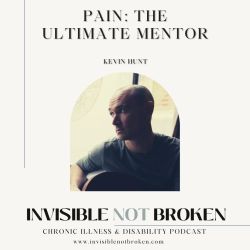
Author of “Pain: The Ultimate Mentor,” Physiotherapist Kevin Hunt
31:29Monica Michelle is joined by author & physiotherapist Kevin Hunt.Kevin lives with chronic pain.In this episode, Monica and Kevin discuss: Kevin’s philosophy of pain management as a physiotherapist who experiences chronic pain. The Hexagon Model, a life-management tool for focusing on what’s important to you.Kevin’s idea behind his new book.Using pain as a guide.TIMESTAMPS00:34 - Kevin’s work as a physiotherapist specializing in the experience of pain 06:44 - The Hexagon Model for managing your life’s needs14:00 - Putting aside the idea of a “quick fix”19:45 - Kevin’s personal experience with pain and how he uses it with patients28:44 - Kevin’s book, “Pain: The Ultimate Mentor”The full transcript and all links mentioned can be found on the episode page on invisiblenotbroken.com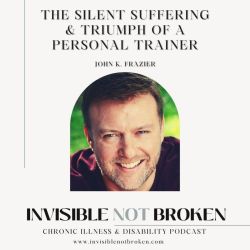
Author of “Through the Pain: The Silent Suffering & Triumph of a Personal Trainer”: John K. Frazier
28:35Monica Michelle is joined by author & personal trainer John K. Frazier.John lives with ankylosing spondylitis.In this episode, Monica and John discuss: John’s work as a physical trainer and authorChronic pain comparisonsPersonal triumphTIMESTAMPS00:50 - John’s business & diagnosis07:19 - Chronic pain olympics09:31 - Talking about & hiding a diagnosis15:09 - Personal triumph18:24 - Staying in the present23:29 - The superman complexThe full transcript and all links mentioned can be found on the episode page on invisiblenotbroken.com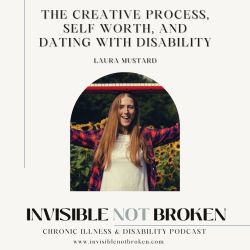
The Creative Process, Self Worth, and Dating with Disability: Laura Mustard
31:08Monica Michelle is joined by musician Laura Mustard.Laura lives with VATER syndrome.In this episode, Monica and Laura discuss: Laura’s inspiration for her upcoming musical EP.How Laura’s illness impacted her recent relationship & self-image.Laura’s creative process, new music, and social media pressure.TIMESTAMPS00:30 - Laura’s new EP / Monica’s recent COVID experience05:32 - Relationships with chronic illness11:20 - Image and self acceptance with disability15:32 - Laura’s creative process and current projects20:05 - Pursuing creativity despite social media attentionThe full transcript and all links mentioned can be found on the episode page on invisiblenotbroken.com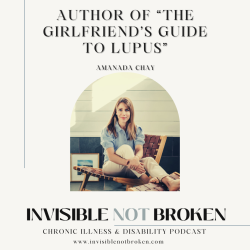
Author of “The Girlfriend’s Guide to Lupus”: Amanda Chay
30:43Monica Michelle is joined by author Amanda Chay.Amanda lives with Sjögren’s and Lupus.In this episode, Monica and Amanda discuss: Amanda’s book & diagnosisOutlooking on work & writingNavigating chronic illness with kids & familyTIMESTAMPS00:26 - Intro + The Girlfriend’s Guide to Lupus02:17 - Amanda’s diagnosis10:09 - Amanda’s outlook on writing17:11 - Navigating chronic illness with kids & family23:29 - Labels and roles26:24 - Flare reads & closing remarksThe full transcript and all links mentioned can be found on the episode page on invisiblenotbroken.com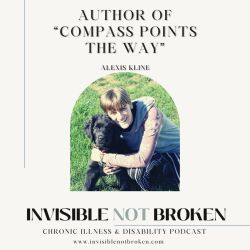
Author of “Compass Points the Way”: Alexis Kline
23:14Monica Michelle is joined by author Alexis Kline.Alexis lives with Dysautonomia.In this episode, Monica and Alexis discuss: Being a sick teenagerHaving an isolated diagnosisProductivity workflowsTIMESTAMPS00:28 - Alexis’s diagnosis & dog07:18 - Sick teenager road map10:00 - Alexis’s book & workflow16:25 - Having an isolated diagnosis20:50 - Wildlife photography, purchases The full transcript and all links mentioned can be found on the episode page on invisiblenotbroken.com
Author of “From the Sidelines to the Finish Line”: Emily Falcon
36:47Monica Michelle is joined by author Emily Falcon.Emily lives with ALCAPA.In this episode, Monica and Emily discuss: Growing up sickPost-surgery supportHaving a public bodySelf-motivation and adventuringTIMESTAMPS00:28 - Being a sick kid & Emily’s book title07:28 - Mortality10:16 - Portrayal of disability in media12:21 - Post-surgery support19:23 - Having a public body23:43 - Self-motivation29:46 - Emily’s tips for adventuresThe full transcript and all links mentioned can be found on the episode page on invisiblenotbroken.com